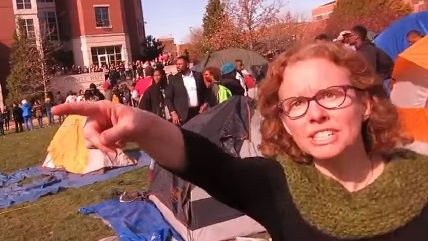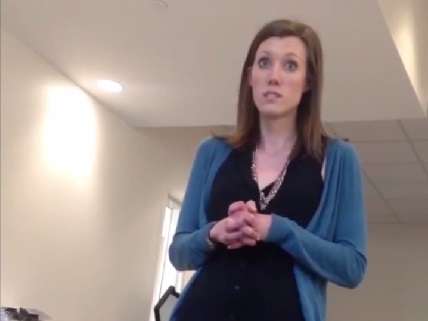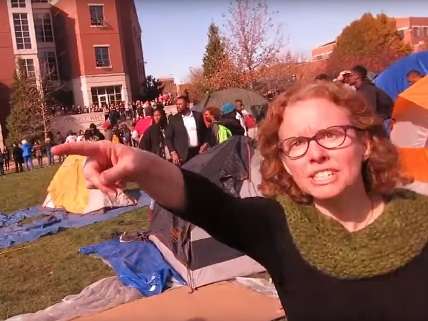Silencing Students: The 8 Most Loathsome Campus Censors of 2015
A banner year for college censorship.

Every year brings new examples of ruthless college administrators trampling the free expression rights of students and faculty, and 2015 was no different. Here are eight of the most notable campus censors I wrote about this year.
Honorable Mention: Eric Posner
Eric Posner, a professor of law at the University of Chicago, hasn't actually censored anyone, so he doesn't make the list. But he certainly provides a great deal of intellectual ammunition for people working to restrict free expression rights—including and especially university administrators, as well as the police. Whether he is arguing that 18-year-olds are better off with fewer rights, or that vast infringements on internet freedom are necessary in order to protect the U.S. from ISIS, Posner is a reliable ally of would-be muzzlers everywhere.
8. The Student Bar Association at the University of Missouri's School of Law
One might expect law students to have a better grasp of First Amendment case law than the average university administrator. But the University of Missouri's Student Bar Association somehow managed to craft a speech code that was not only just as bad as anything the campus bureaucrats might have come up with, but also grammatically incomprehensible.
The code, intended as a mandatory social media use policy for students in MU's law school, forbade students from commenting "despairingly on others." No, not disparagingly, but despairingly. It also disallowed "negative or inappropriate content," required transparency, but prohibited excessive transparency. As I observed in November, "The rules not only restrict speech—they also compel it; 'Engage in conversation,' the policy blithely commands."
The Student Bar Association evidently believed it could require other students to monitor the web and report all potential infractions to the group. "It is the duty of each member of the SBA to report instances of possible non-compliance with this policy to the Vice-President of the SBA," according to the policy.
Thankfully, the SBA caved to much-deserved criticism and scrubbed the rules from its website. At least these student-censors weren't very brave.
7. Rochelle Mason
There's nothing novel about a college administrator punishing someone for a speech transgression, but Colorado College's Rochelle Mason distinguished herself by levelling an almost unbelievable sanction on student Thaddeus Pryor: a two-year ban from campus.
What was Pryor's crime? He participated in an offensive discussion via the anonymous commenting app, Yik Yak. Someone posted "#blackwomenmatter," and Pryor responded, "they matter, they're just not hot." The remark was cruel, but Pryor owed the campus an apology, not his scalp.
It's not clear how administrators deduced that Pryor had made the comment, but he was soon called before Mason, an associate dean of students, where he confessed and apologized. She subsequently exiled him from campus until August 28, 2017. Thanks to the timely intervention of the Foundation for Individual Rights in Education, the punishment was eventually reduced to a six-month suspension. Still, half a year in academic limbo is quite a punishment for someone whose only crime was a thoughtless comment about not being attracted to black women. David Hendrickson, a professor of political science at CC, told The Cipher that Pryor's treatment was "inappropriate and unjustifiable."
"The punishments have left entirely unclear the boundaries of acceptable speech," said Hendrickson. "A lot of students feel that they are walking on egg shells."
6. Feminists United on Campus
Tragedy struck the University of Mary Washington last April: a female student, Grace Mann, was murdered inside her off-campus home. The perpetrator, a male roommate, was immediately caught.
Feminists United on Campus, an activist group at UMW, used Mann's death to argue that the campus was unsafe for women—not because murderers were roaming the streets, but because UMW had failed to prohibit offensive speech. Specifically, members of FUC were incensed that the campus had not shut down Yik Yak, where anonymous users had been posting offensive and occasionally threatening things about the group. President Richard Hurley responded by asserting that taking action against Yik Yak would violate students' free speech rights.
"The speculative connection FUC and the Feminist Majority Foundation claim exists between Grace Mann's death and Yik Yak commenters spreads misinformation, and worse yet, it adds undue pain for the grieving Mann family," he wrote.
FUC also accused UMW's rugby team of sexism because students—not all of them rugby players—engaged in some offensive chanting at a party. In response, administrators forced team members to attend sensitivity training and eventually disbanded the team altogether.
5. The University of Kentucky's Student Government
Quick! Choose one of the following options:
- A single designated free speech zone in a specific location on campus
- Multiple designated free speech zones in various locations across campus
- No preference
The University of Kentucky's student government clearly thinks it's important to give students the illusion of choice before crushing their free speech rights. The group emailed the above survey to members of campus and offered them a chance to win $250 if they completed it. They didn't include an option for students who actually value their constitutional rights, unfortunately.

4. Abby Dawson
There are unhelpful college administrators, and then there's Abby Dawson. This Kennesaw State University advisor refused to assist a student and then accused him of harassment because he was sitting down and wouldn't leave. "Sitting here until somebody is available is harassing," she said. "Would you like for me to call campus security?"
This was not Dawson's first moment of unjustified hostility. According to The Huffington Post, she had quite a history of unhelpfulness. She evidently thought her job was not to advise students, but to crush their souls and sic the cops on them if they sat for too long.
3. Northwestern University's Title IX Bureau
No one expects the Spanish Inquisition, the famous line goes, but everyone following campus news in 2015 has come to expect the Title IX Inquisition. Students and professors who make controversial statements about sex and relationships are at risk of triggering an investigation by bureaucrats dedicated to an overly broad definition of sexual harassment.
Laura Kipnis, a professor at Northwestern University, learned this the hard way. After she penned an article for The Chronicle of Higher Education about how the university's oppressive Title IX bureaucracy was making life worse on campus, students who didn't like her views filed complaints against her. She was subsequently subjected to an absurd investigation that wasted both her time and the university's financial resources. And though she was ultimately cleared of any wrongdoing, professors who advocated on her behalf were eventually accused of violating Title IX as well.
Thought-crime investigations take a toll on the climate for academic freedom on campus. They also justify the existence of a lot of administrators, and enrich a lot of lawyers.
2. Sarah Trower
Title IX strikes again—this time at the University of Kansas, where student Navid Yeasin was expelled for calling his ex-girlfriend (also a student) a "psycho bitch" on Twitter. That wasn't very nice of him, but it certainly wasn't illegal. Nevertheless, administrators expelled Yeasin for his tweet—even though it didn't specifically mention the girlfriend, and even though she had no way of seeing it since he had already blocked her.
Yeasin sued the university and the case went to court, where a judge agreed with Yeasin that a public university could not punish him for his hostile tweet. But KU appealed the decision: lawyer Sarah Trower argued that Yeasin violated Tile IX and deprived his girlfriend of her right to a hostility-free campus environment. "You can't… [be] seeking to alienate her," said Trower at the Court of Appeals hearing.

1. Melissa Click
In George Orwell's dystopian masterpiece 1984, an agent of the authoritarian state tells the soon-to-be-brainwashed protagonist, "If you want a picture of the future, imagine a boot stamping on a human face—forever." Student-journalists, meet your very own boot-stamper: Melissa Click, an assistant professor of communications at the University of Missouri, who easily captures the #1 spot on this list.
In early November, student protesters at the University of Missouri demanded that the president resign for failing to ease racial tensions on campus. After this demand was met, the triumphant activists gathered in a public field and declared the area a "safe space" for demonstrators. Dutiful student-journalists Tim Tai and Mark Schierbecker attempted to photograph and interview some of the protesters, but other students and faculty members deliberately blocked their path in order to shield the activists from scrutiny.
None did so with more censorious zeal than Click, who repeatedly attempted to banish Shierbecker from the space. "You need to get out!" she repeated over and over again as she placed her hand over his camera lens. When he asserted that he had just as much a right to use the space as anyone else, Click tried to recruit people to forcibly remove him. "I need some muscle over here!" she shouted.
The media later learned that Click held a courtesy appointment in Mizzou's School of Journalism (she resigned after the video footage surfaced). If you want a picture of what's to come on college campuses next year, imagine the hate-filled visage of Click as she stomps on a student's camera—forever.


Show Comments (115)